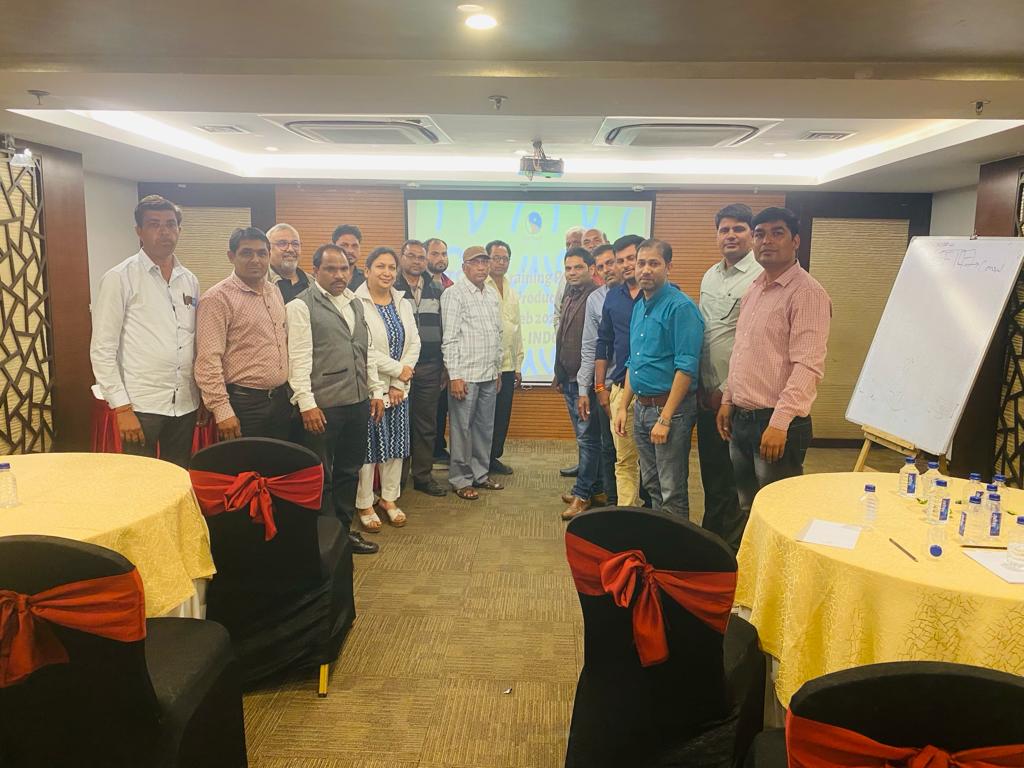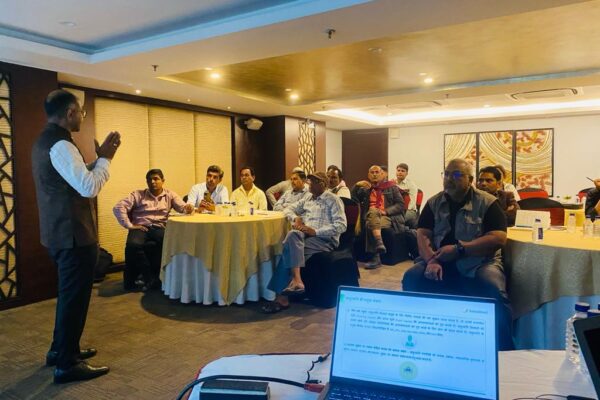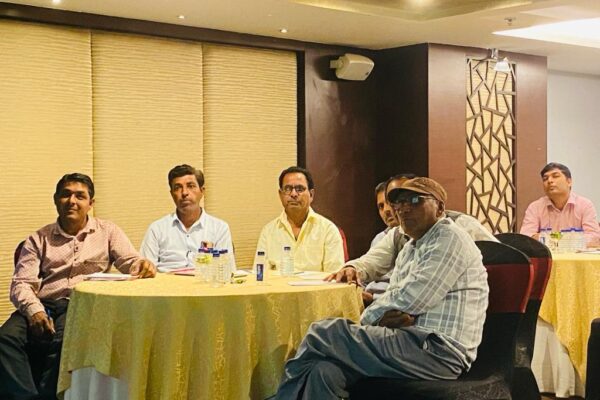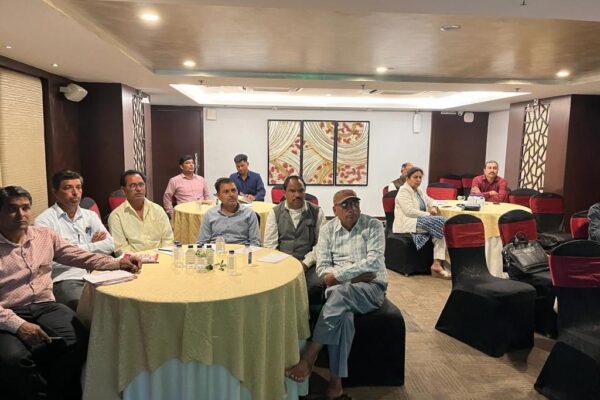Fairtrade serves as a global system bridging farmers and workers from sourcing countries with consumers and businesses worldwide. Yet, non-compliances pose a challenge within the Fairtrade framework that endangers the certification’s integrity and undermining producers’ livelihoods. These deviations from standards not only jeopardize market access and premium prices but also impacts the socio-economic development of producer communities. Thus, it’s paramount to address and prevent such deviations to uphold the principles of Fairtrade.
Fairtrade NAPP organized a one-day workshop that welcomed 17 participants representing three Fairtrade producer organizations located across the districts of Karahi, Khargone, and Neemuch in Madhya Pradesh, India. Alongside these esteemed attendees, delegates from various service providers also graced the occasion. The workshop encompassed a diverse agenda aimed at empowering producers and promoting sustainable practices within the region. Participants were actively engaged in comprehensive training sessions focusing on Fairtrade Standard requirements, particularly addressing prevalent non-compliances in the area. The workshop aimed at incentivizing producer participation and fostering community development.
“We Learnt about topics on Fairtrade Standard, Democracy, Transparency, Fairtrade Development Plan and other concepts. These are very helpful and the training was very excellent.”- Raman Gangwar, Holistic Organic Farmers Producer Company Limited.
The first session explored into the challenges of non-compliances encountered by the producer organization. Through an analysis of the non-compliances prevalent in the region, this dedicated session aimed to raise awareness among producers regarding the significance of these requirements and how to adhere to them to fulfil Fairtrade interventions effectively. The topics covered included:
- Fairtrade Development Plan: Participants gained insights into the usage, intent, and process of developing the Fairtrade Development Plan. They were briefed on the responsibilities, implementation procedures, and reporting protocols associated with the Fairtrade Development Plan.
- Organization Development Plan: The session emphasized the necessity of the Organization Development Plan (ODP) and elucidated its distinctions from the FDP. Participants learned about the benefits of the ODP and its role in facilitating the transition of informal groups into formal entities, thereby promoting the empowerment of workers.
- Trade Requirements: Traceability, sourcing, contracts, and trademarks emerged as critical areas requiring heightened attention. Traceability, especially, was underscored as essential and rigorously scrutinized during audits, ensuring transparency from farm to buyer.
- Fairtrade Pillars: Democracy, Transparency, and Participation were highlighted as fundamental pillars underpinning all activities in the field. Participants were reminded that any compromise on these aspects could undermine the intent of Fairtrade and therefore must be strictly adhered to.
This session offered precise guidance on navigating the challenges of non-compliance. It provided participants with clear direction on moving forward. It served as a valuable checkpoint on their current position and the necessary steps to achieve certification. Nagendra Rai from Sungold (Maa Durga Krishak Utthan Samiti) have appreciated this session and its way forward as it is helpful for them to understand their position.
During this session, producers gained valuable insights into Fairtrade Projects and Programmes. They learnt the wide range of services and initiatives geared towards supporting producers and advancing sustainable practices. These initiatives include Certification Advisory Training, Standard Consultation, Environmental Research, Technology Pilots, Campaigns, Fairtrade Impact Stories, and programs tailored for Youth and Gender empowerment. Producers were encouraged to actively engage in these activities to highlight their initiatives, enhance market visibility, and optimize benefits.
In the subsequent session focused on Human Rights, Environment, Development, and Diversity (HREDD), participants were introduced to its significance and provided with contextual understanding. The session underscored the impact of European Union legislation on future business protocols, particularly concerning exports. Discussions encompassed forthcoming changes in Fair Trade standards and European laws that would affect producer organizations. Key themes were delineated, emphasizing the necessity for adequate producer support. The overarching objective of the session was to bolster the capacities of producer organizations to adhere to these requirements effectively. Ultimately, participants gained a robust comprehension of fairtrade standards, equipping them to address non-compliance proactively and contribute to positive social and environmental outcomes through the formulation of Corrective Action Plans and adherence to Social Premium Organization compliance.
Spearheaded by Cropin Technologies under the guidance of Mr. Varun Bhanot, the concluding session showcased the company’s specialization in farm management software solutions. Their platform provides a suite of digital tools facilitating data-driven decisions, encompassing crop monitoring, yield forecasting, risk assessment, traceability, and market access. These tools serve to benefit agricultural stakeholders by optimizing operations and enhancing productivity, safety, and income. Notably, the event also offered insights into technology-based interventions, with presentations from esteemed agro-based organizations like Sammunati and Agronxt. These organizations shared their expertise and explored potential pilot opportunities for future collaboration. It was well appreciated by Anjali Mittal from Pratibha Vasudha Jaivik Krishi Kalyan Samiti as it provided a clarity regarding the standards and really liked the bhuparikshan- soil testing system. It will help them in taking this support forward.
The impact of the session was significant that resulted in actionable points to enhance producers’ understanding and compliance with fairtrade standards. Follow-up sessions are planned to explore deeper into specific aspects of fairtrade with a special focus on HREDD to raise awareness among producers. Additionally, opportunities for scaling up afforestation and other projects based on producers’ interests have been on further discussion. The meeting concluded with a commitment to mutual support and ongoing training initiatives, with feedback collected to improve future program delivery. let’s make a difference by actively selecting fairtrade products, ensuring fair wages and sustainable practices for producers worldwide. Every purchase is a vote for ethical trade, contributing to a brighter future for communities around the globe. Together, let’s create a fairer and sustainable future for all.
“The training helped me to learn about HREDD, new laws and directives on social aspects, afforestation projects and organisational development Plan. These will be helpful for us.” – Kuwarsing Dawar.








